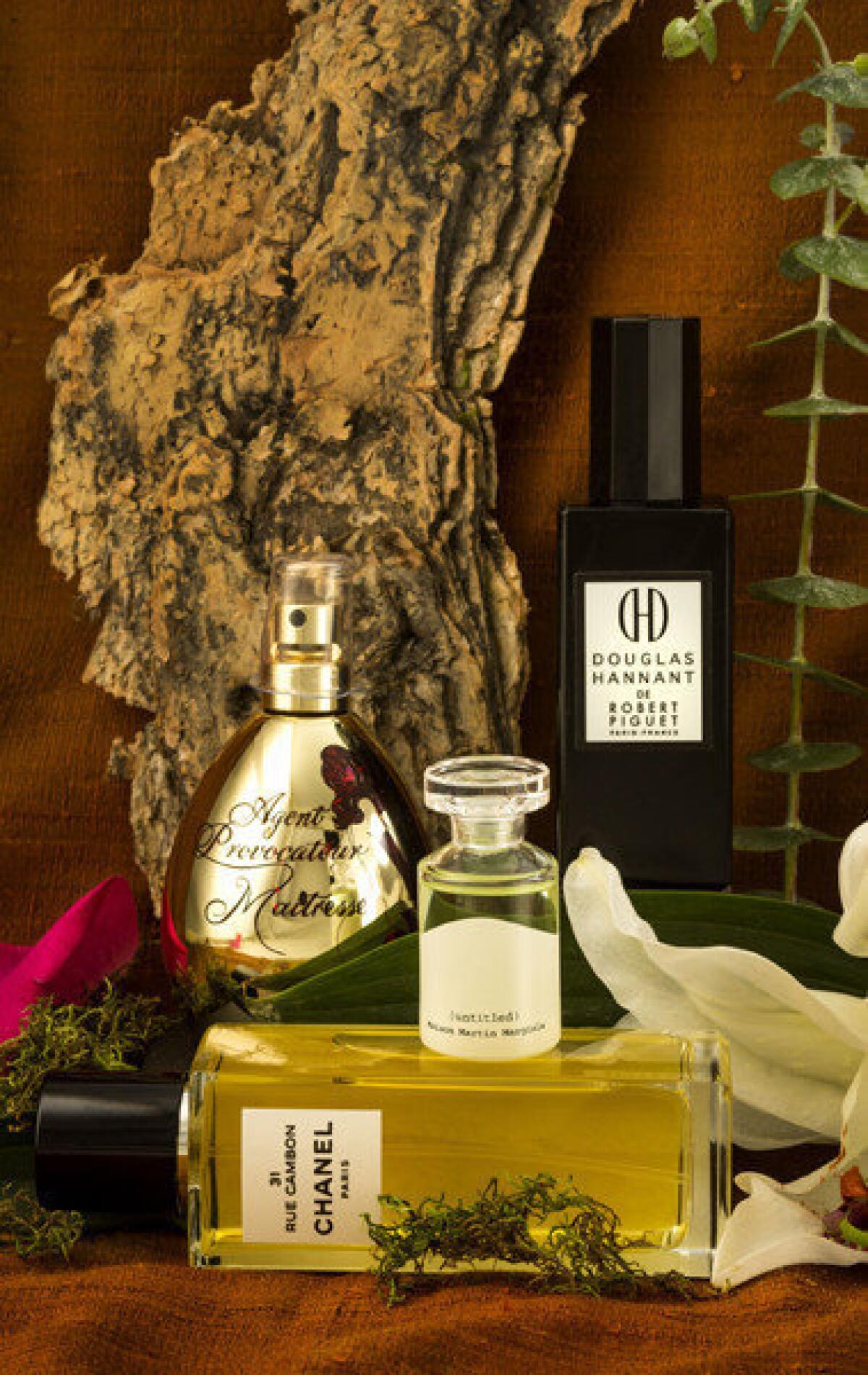Perfumers reach back to the Golden Age for vintage scents

- Share via
In the same way that fashion designers scour the trunks and attics of the past for inspiration, perfumers periodically dip into the well of classic French perfumery when creating new fragrances.
This seems to be one of those times.
After decades in which pastel aquatics — think L’Eau d’Issey and its descendants — reigned supreme, the pendulum has swung so that a number of recent releases once again evoke the glam, retro feel of perfumery’s Golden Age in the first half of the 20th century.
“Customers are hungry for high-calorie perfumes that are long lasting and reveal more of an olfactory experience,” says Christopher Chong, head perfumer for the luxury brand Amouage, whose perfumes can develop on the skin and last an entire day.
“There seems to be a return to the classics,” says Karen Grant, who tracks the beauty industry for market research firm NPD Inc. “It’s more sultry and warm notes than you’ve seen in the past for women,” she adds. For men, it’s “aromatic fougeres,” a genre of colognes with lavender, herbal and woodsy notes.
Grant says that niche perfumers sparked this trend but cites the success of Mont Blanc Legend, Gucci Guilty and Prada’s Luna Rossa for men and Viktor & Rolf’s Flowerbomb, Valentino’s Valentina and Chloe for women as examples of department-store perfumes with a retro, classic feel.
For those reared on modern compositions, notes like violet, rose, powder and leather can seem almost quaint and old-fashioned. Your grandmother probably dabbed on rosewater, but sexy lingerie firm Agent Provocateur has recast the prim floral as a modern bombshell. Agent’s first perfume was a rich, retro chypre (a perfumery style known for the ingredients bergamot, oakmoss and labdanum), brimming with rose, saffron and green notes. Later releases such as Strip, Maitresse and last year’s Petale Noir extended the theme of full-bodied raunchy florals and florientals that evoke Ava Gardner more than Cate Blanchett.
Galbanum, a bitter aromatic gum resin extracted from certain plants with a bracing green note, became a star in 1947 with Germaine Cellier’s iconic Vent Vert for Balmain. More than half a century later, Untitled by Maison Martin Margiela wraps galbanum in florals and citrus. Frapin’s Paradis Perdue, Invisible Monster by Christopher Brosius’ I Hate Perfume and Tommi Sooni’s Tarantella also have hefty lashings of galbanum.
Tuberose, another old-school scent, is the powerful, indolic white flower featured in Robert Piguet’s 1948 classic Fracas and a dominant note of big-hair diva perfumes Giorgio, Poison and Amarige.
Banished to the perfume hinterlands for flagrant overuse, tuberose has made a stealthy comeback in Madonna’s Truth or Dare, Michael Kors, Kim Kardashian and skin care guru Kat Burki’s new Tuberose perfumes.
Burki grew up surrounded by classic perfumery — including Fracas — and loves its glamour.
“That’s part of my inspiration and goal — to expose younger buyers to experience a classic in an approachable way,” she says.
Gardenia is another sultry tropical floral that’s sashayed back into the public eye after its rich, overripe honey-dipped style — epitomized by Tuvache’s 1932 Jungle Gardenia — fell out of fashion. Today Serge Lutens channels the ghost of Jungle Gardenia with Une Voix Noire. For a more stripped down and clean gardenia, try a perfume called Kai.
The most challenging genre for those reared on Cool Water and Kenzo Flower might just be chypres. Several years ago, chypre perfumes seemed destined for extinction due to restrictions on oakmoss — considered an allergen by IFRA, the International Fragrance Assn. that regulates perfumers. But by using treemoss and turning to synthetics, a modern breed of chypres has risen triumphant.
Luxury brand Clive Christian’s new perfume V is a giant old school chypre that almost eerily recalls the classics of yesteryear. Guerlain’s reissue of its 1933 masterpiece Sous le Vent could have you reminiscing for days gone by. Young Australian perfumer Tommy Sooni’s Tarantella is a modern chypre worthy of the name. Even Chanel has tried its gilded hand with 31 Rue Cambon.
Tommi Sooni’s Passerelle illustrates the return in modern perfumery of symphonic florals, which are complex and multilayered. Designer Juliet Stewart’s lush Juliet falls into this camp. So does Frederic Malle’s Portrait of a Lady, perhaps the most sumptuous rendition of rose, spices, woods, musk and patchouli to be found outside a time machine.
Niche perfumer Andy Tauer’s recent Miriam (powdery tea rose, violets, mossy leaves, sandalwood, green notes and aldehydes, chemicals that add a bubbly champagne sparkle to perfumes like Chanel No. 5) is “a fragrance that you could have smelled in the forties or fifties,” Tauer wrote on his blog. “It has this vintage aspect.”






